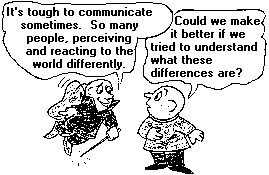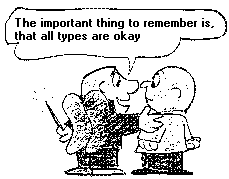Traditionalist | SP Experiencer | NF Idealist | NT Conceptualist
ISTJ | ISFJ | ESFJ | ESTJ | ISTP | ISFP | ESFP | ESTP | INFJ | INFP | ENFP | ENFJ | INTJ | INTP | ENTP | ENTJ
The Myers-Briggs Personality Types
Welcome to my web site on the different Myers-Briggs personalities. I have collected information from several resources, books, lectures I have attended, and magazines (so, no, I did not write the majority of this). This website is strictly for my family, coworkers, and friends.  I felt that I needed to create a site which I could share with others what I have learned over the years and to introduce them to important concepts which could improve their lives better. Personally, I have found the Myers-Briggs Type Indicator to be a positive influence on my life and want to share it with you. It has helped me to understand and how to get along better with all of my relationships. Finally, it has helped me to understand myself better as well.
I felt that I needed to create a site which I could share with others what I have learned over the years and to introduce them to important concepts which could improve their lives better. Personally, I have found the Myers-Briggs Type Indicator to be a positive influence on my life and want to share it with you. It has helped me to understand and how to get along better with all of my relationships. Finally, it has helped me to understand myself better as well.
The Myers-Briggs Type Indicator (MBTI) is commonly used by corporations and by marriage counselors. Corporations will type their employees and train in the hopes that everybody learns to get along with types that are different from themselves, to communicate better. Marriage counselors use the MBTI to help spouses communicate better through understanding.
All Types have a four letter description
The Myers-Briggs Type Indicator (MBTI), reports your preferences on four scales. Each scale represents two opposite preferences. The four letters that make up your type can help you understand yourself and your interactions with others.
The possible letter combinations are:
- I or E
- S or N
- T or F
- P or J
If you would like to learn what the different types of letters mean; I or E; S or N; T or F; J or P, click here.
The 16 Types - % of Population
|
TRADITIONALISTS (SJ) |
EXPERIENCERS (SP)
| |
IDEALISTS (NF) |
CONCEPTUALIST (NT) |
 |
Introverted Sensing
ISTJ, ISFJ
17 % |
Introverted Sensing
ISTP, ISFP
15 % |
 |
Introverted iNtuitive
INFJ, INFP
5 % |
Introverted iNtuitive
INTJ, INTP
1 % |
 |
Extraverted Sensing
ESTJ, ESFJ
28 % |
Extraverted Sensing
ESTP, ESFP
25 % |
 |
Extraverted iNtuitive
ENFJ, ENFP
7 % |
Extraverted iNtuitive
ENTJ, ENTP
2 % |
The Personality Types Indicate Preferences, Not Abilities
Your type is the combination of preferences you chose when you answered the test. It is up to you to decide what type you truly are, since only you know your true preferences. The scores on the test indicate clarity of preference, not strengths or abilities to perform in the various areas. All of us use all of the functions at different times; your type indicates those functions you prefer to use most often. For example, Sensing "S" types are capable of abstract thought, but its not their preferred action, it takes more energy than it would take an iNtuitive "N" type. By the same token, iNtuitive types are capable of being more sensing of their environment, but its not their preferred action, it takes more energy than it would take a Sensing type. Extraverted people can enjoy moments of quiet introspection just as Introverted people can enjoy being around strangers.

My point is, the different types have preferences, not a limitation of abilities. This discussion of personality types is not to imply we aren't capable of resonding to different situations with what is needed, instead, it is to point out preferences that we have that direct our long term choices in life, our relationships and our careers.
We All Have Special Gifts
There are no "good" or "bad" types. All types contribute special gifts to the world. Knowing your type can help you understand and develop both your most and least preferred functions, as well as help you understand and work with other people.
 I felt that I needed to create a site which I could share with others what I have learned over the years and to introduce them to important concepts which could improve their lives better. Personally, I have found the Myers-Briggs Type Indicator to be a positive influence on my life and want to share it with you. It has helped me to understand and how to get along better with all of my relationships. Finally, it has helped me to understand myself better as well.
I felt that I needed to create a site which I could share with others what I have learned over the years and to introduce them to important concepts which could improve their lives better. Personally, I have found the Myers-Briggs Type Indicator to be a positive influence on my life and want to share it with you. It has helped me to understand and how to get along better with all of my relationships. Finally, it has helped me to understand myself better as well.



